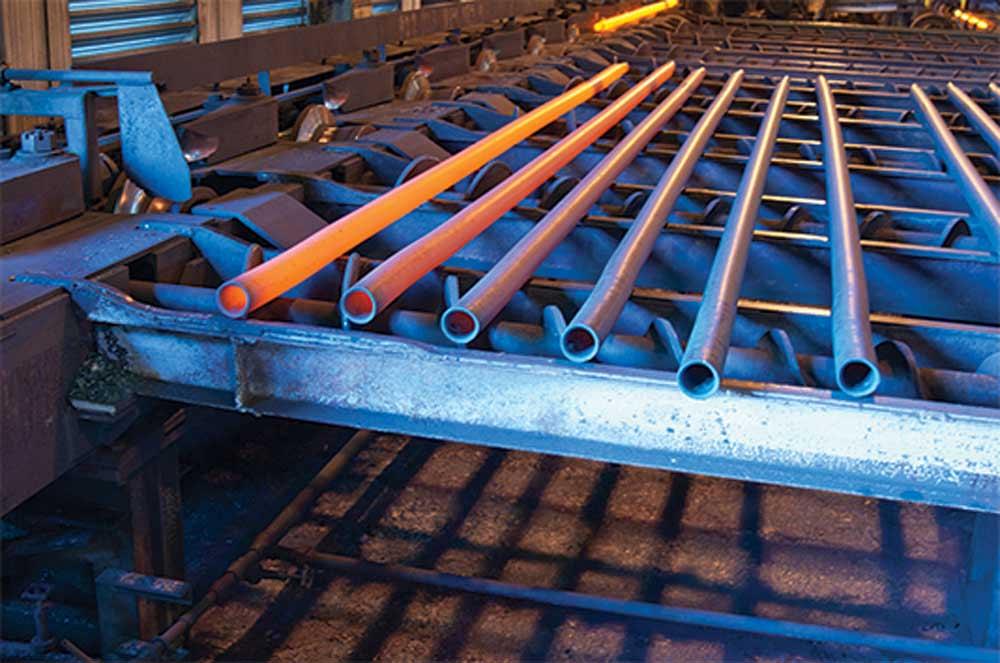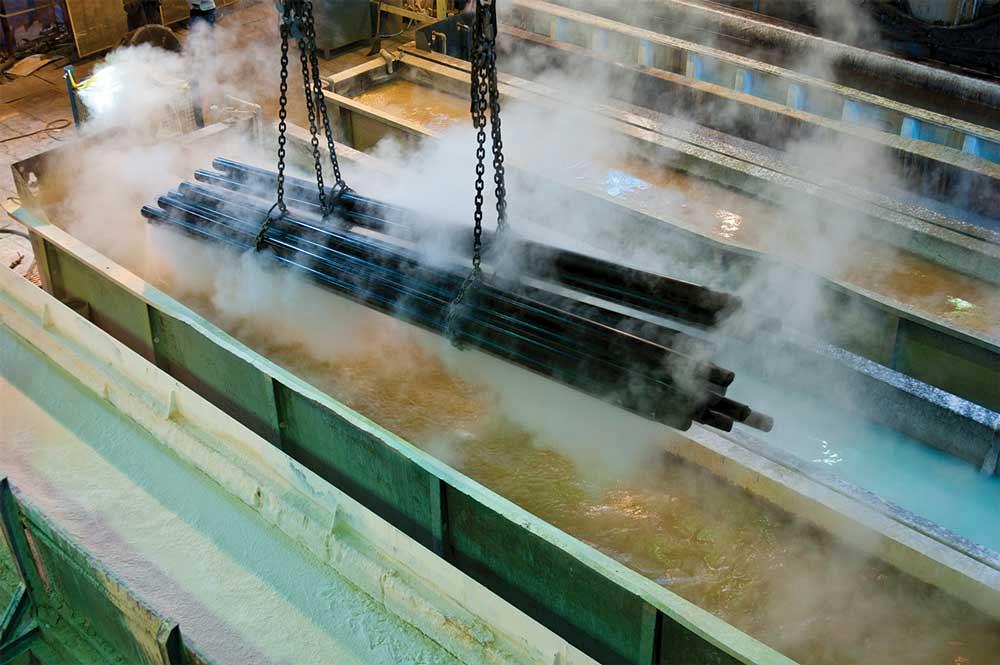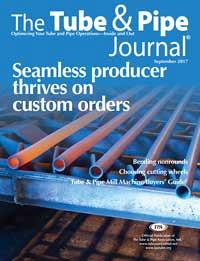- FMA
- The Fabricator
- FABTECH
- Canadian Metalworking
Categories
- Additive Manufacturing
- Aluminum Welding
- Arc Welding
- Assembly and Joining
- Automation and Robotics
- Bending and Forming
- Consumables
- Cutting and Weld Prep
- Electric Vehicles
- En Español
- Finishing
- Hydroforming
- Laser Cutting
- Laser Welding
- Machining
- Manufacturing Software
- Materials Handling
- Metals/Materials
- Oxyfuel Cutting
- Plasma Cutting
- Power Tools
- Punching and Other Holemaking
- Roll Forming
- Safety
- Sawing
- Shearing
- Shop Management
- Testing and Measuring
- Tube and Pipe Fabrication
- Tube and Pipe Production
- Waterjet Cutting
Industry Directory
Webcasts
Podcasts
FAB 40
Advertise
Subscribe
Account Login
Search
Tube and pipe producer excels in unique dimensions, shapes, lot sizes, and customer service
MST thrives in niche others overlook
- By Eric Lundin
- August 23, 2017
- Article
- Shop Management
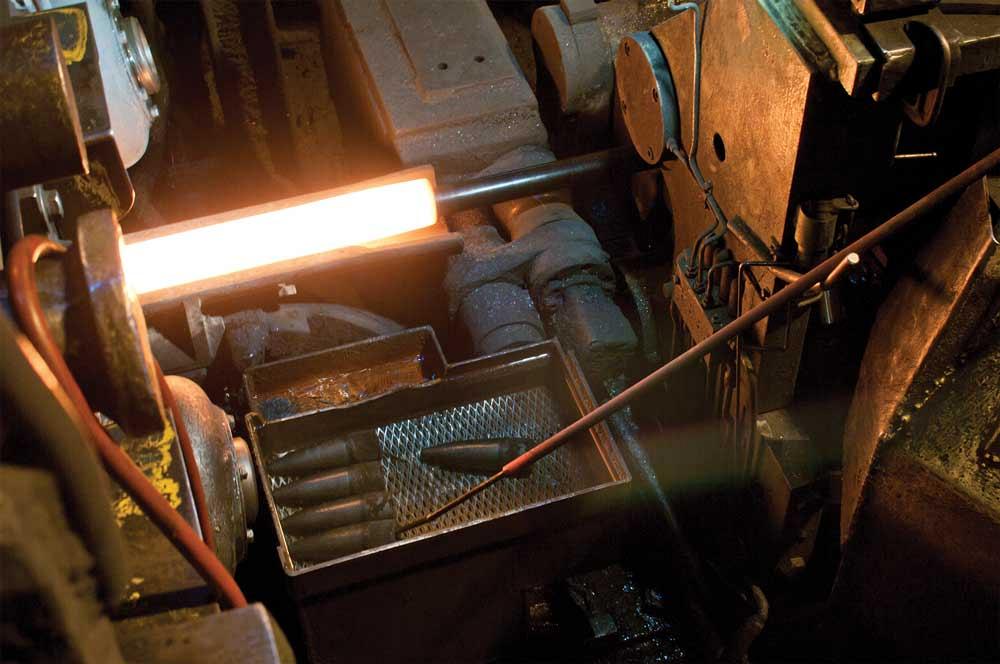
After heating billets of bar stock in a rotary furnace, the staff at MST uses a piercer mill to change the form from solid to hollow. The tray in the foreground holds spare piercing dies.
Everyone who loves cars knows that Jay Leno has dozens of unique, mainly antique, cars and motorcycles, and nearly everyone with a television knows that his stable is Big Dog Garage, Burbank, Calif. Everyone who reads The FABRICATOR® knows that maintaining this fleet is a big job, often requiring replacement parts made from scratch, occasionally on a waterjet (“Bernie and the jet,” The FABRICATOR, April 2006). What everyone doesn’t know is that sourcing replacement pressure lines for Leno’s steam-powered cars wasn’t easy, but a search turned up a tube maker near Detroit that was ready, willing, and able. That company, MST Seamless Tube & Pipe, South Lyon, Mich., thrives on making unusual orders, whether it’s a matter of dimensions, shape, lot size, or all three.
As its name implies, the company makes seamless tube and pipe. It uses a rotary furnace to heat billets of carbon or alloy steel, a piercer mill to turn those billets into lengths of seamless product, and a pilger mill or draw benches to bring the product down to the final size (see Figure 1). It might sound like a standard seamless producer, but it’s not.
“We’re not unique in the products we make or the processes we use,” said Vice President Ted Fairley. “We’re unique in customer service.”
That starts with the vast number of mandrels and dies the company has on hand. In business since the late 1920s, the company has had nearly 100 years to accumulate mandrels, dies, and tooling expertise. The company doesn’t consider its dies and mandrels to have fixed sizes, but sizes that can be modified readily to meet customer requirements. Cleaning up an old die or mandrel, or some grinding or polishing to take one down a bit, are standard procedures at MST.
In the case of Big Dog Garage, the order for Leno comprised seven sizes of pressure pipe that may have been common at one time but no longer are available off the shelf. Making unusual sizes for old steam-powered cars or any other application isn’t a problem for MST. It’s not every day that MST ships an order to a celebrity, but modifying its tooling to get a customer out of a jam is commonplace.
Two more differentiators are the size of the average order and the size of the company. First, MST has a reputation for taking orders that are small—so small that many of its competitors turn them down. Second, the company is small and doesn’t have a cumbersome bureaucracy. It’s nimble. When MST needs to change the production schedule to help a customer in a crisis, it can do so without a lot of hassle. In an era in which most companies keep inventories to a minimum, MST has a reputation for fulfilling small, urgent orders quickly, Fairley said.
“For us, every order is a custom order,” said General Manager of Operations Tom Sleder. “This is a job shop. Every order is unique.” Seamless tube is readily available in discrete sizes from many sources, but MST specializes where others don’t, whether it’s a matter of nonstandard diameters, unusual shapes, or small production runs.
Making Seamless Tube and Pipe in Michigan, Then and Now
Founded in 1927, the company initially focused on pressure products. Since then it has expanded its scope to include oil country tubular goods and mechanical tube. It deals in carbon and alloy steel in a variety of grades for meeting ASTM, ASME, API, military, and AMS requirements. The company galvanizes products for corrosion resistance and offers a proprietary product, Blue Diamond®, an ultraviolet-light-cured protection against rust (see Figure 2 and Figure 3).
Beyond all these product offerings, it occasionally makes really unusual tubing.
“One customer was purchasing a heavy-wall tube, cutting it into lengths of 3 or 4 feet, and machining two keyways into the ID, 180 degrees apart,” Fairley said. MST offered to draw the product over a mandrel that would create the same ID and four keyways. The two additional keyways would make the product symmetric which, Fairley pointed out, helps to keep the mandrel centered.
To MST’s surprise, adding two keyways was a good idea for the end user as well.
The tube was used for oil extraction, and the keyways were needed to prevent a hard rubber insert from rotating in the ID. The application tore up the two keyways, so eventually the assembly had to be replaced. Having two more keyways meant that the rubber insert could be removed, rotated 90 degrees, and reinserted for further use. It effectively doubled the service life of the component and eliminated the time and tooling needed for machining the pipe. The customer approved the new product, so although MST charges a little more than it did when the tube had a standard round ID, the total cost of the product is much lower, the lead times are shorter, and the product lasts twice as long. It’s a rare win-win-win-win.
This doesn’t mean that the company always makes novel sizes.
“Once in a while, someone designs a widget, and they specify 2-inch tube with a ¼-in. wall, or some other size that is close to one of our die sizes,” Fairley said. “If we have tooling on the shelf to make tube 2.005 in. diameter and a common wall thickness, we’ll ask if that size would work.” It’s a matter of saving the customer some money and some time (which, of course, is money).
A Focus on Employees (Who Focus on the Customers)
Management makes no claim to shouldering the burden of customer service. MST’s executive group is more akin to a coaching staff than a management staff, one that guides a team of several hundred who take customer service to heart.
“A few years ago, we created a profit-sharing program,” Fairley said. The company tracks six key indicators: safety, on-time deliveries, yield, variable costs, margins, and remakes. According to Fairley, the profit-sharing program effectively banished the conventional, mainly adversarial, union-versus-management environment. MST posts the measureables prominently, and everyone, union and management alike, takes a keen interest in the company’s progress toward the goals. It’s clear that two goals, maximizing on-time deliveries and minimizing remakes, benefit the customers directly. Three of them—optimizing safety, maximizing yield, and minimizing variable cost—benefit MST directly and customers indirectly by keeping the company competitive, allowing it to hold the line on costs. The last goal, maximizing margins, is the only one that accrues solely to MST. It’s hard to find a drawback in a program that is focused mainly on the customers.
In a conventional union shop, seniority is everything, but the profit-sharing concept has nothing to do with seniority; the share of profit is based on wage only, and according to Fairley, it can be hefty. When the business climate is lukewarm, each worker can expect a 10 percent bonus check; when business heats up, the bonus can be can be more than 20 percent, Fairley said.
A Long, Hard Road
Getting here has been anything but easy. Although the recession of 2001 sounds like ancient history in light of the Great Recession, it was a turning point in the company’s history. That recession wasn’t long by historical standards, but it was severe, and the recovery for many industries was painfully slow. MST slipped into bankruptcy and shut down in 2002, but fortunately it found a buyer and resumed operations shortly thereafter.
“Before the bankruptcy, the company was heavily involved in automotive,” Fairley said. Since then, it has taken several strategic steps to realign itself.
“We do very little work for the automotive industry these days,” Fairley said. In any given month, MST’s biggest industry is energy (oil and gas), with boiler tube for power generation taking the second spot. Third is carbon steel mechanical tube for applications such as transportation, construction, and agricultural equipment. As far as specific customers, the distribution is very good. The largest represents about 7 percent of its revenue, and the top 10 customers make up about 40 percent of the revenue.
“Ideally, if you had 50 customers, you’d want each to represent 2 percent of your business,” Fairley said, and while that’s not practical for most job shops, MST is about as close as it can get to an ideally diversified customer base.
By broadening itself in products, industries, and customers, and by focusing on small orders and short lead times, the company has found a path that makes it much less prone to economic cycles. Manufacturing has long been known as the industry most vulnerable to recessions, usually suffering the fate of being first in and last out, and suffering the most severely. MST’s ability to respond quicker than many competitors, and its willingness to ship small orders, has put the company in a different category altogether.
“We’re last in and first out,” Fairley said.
Fairley acknowledged that the downturn in the oil and gas market has affected MST. The spot price of crude oil, which averaged $101 per barrel during the first half of 2014, was half that during the first half of 2017. That notwithstanding, the company is going strong, running two 10-hour shifts per day, six days a week, during the first half of 2017.
This doesn’t mean that the company is on Easy Street. Finding workers with skill sets that match the company’s needs is difficult, at best. Many of the legions of young men who took vocational courses in previous decades—often the same teenagers who learned additional lessons, such as how to keep an internal-combustion engine purring—learned to work with their hands and became millwrights, tool-and-die men, and equipment operators when they transitioned from high school to the workforce. Many vocational programs folded, video games overtook horsepower, and like most other manufacturers, MST struggles to find skilled labor.
“We need a lot of mechanics and we need a lot of electricians,” Sleder said. “Right now, the construction boom in downtown Detroit is a big draw to electricians, so it’s increasingly competitive.” Another difficulty, certainly one most manufacturers face, concerns MST’s breadth and depth of equipment. Some control systems are analog, some are digital, and repair parts aren’t always easy to find.
“It’s hard to find maintenance people with the right background when you have cranes that are 50 years old and a pilger mill less than two years old,” Fairley said.
Capacities
Most tube and pipe producers can specify every production capacity down to a couple of decimal places, whether it’s ID, OD, wall thickness, or length. In the case of MST, specifying a capacity is like trying to hit a moving target. Because it has hundreds of dies and mandrels, ID and OD limits are hard to pin down, as are the combinations of ID and OD. MST has practical limits just as any other tube and pipe producer has, but the company prides itself on its ability to make unusual diameters and wall thicknesses.
Length depends on the size of the initial billet and the dimensions of the final product. Given a specific billet size, a small-diameter, thin-wall product will be much longer than a large-diameter, heavy-wall product. The practical limit concerns moving products through the plant and getting them out the door. MST’s pilger mill can generate tubes more than 100 ft. long, but most orders max out at 42 ft. To unload an item from the mill, move it through the facility, and load it onto a truck, the longest length practical length is around 52 ft.
The owners often ask management about another capacity: How many tons can MST produce in a month? Because the company benefited from a handsome level of investment over the last several years, about $50 million since 2011 by Fairley’s estimate, the executive team doesn’t have an accurate number to report to the owners. Sheer volume isn’t MST’s forte, anyway. This is a small company that accepts small and unusual orders, specializing in shipping orders quickly. Often a small boiler repair turns into a big repair when the repair team starts to tear into the piping and realizes that its heat exchanger is in worse shape than suspected. A project involving several dozen pipes can turn into a project involving several hundred, and because the boiler is out of service, the team needs the additional replacement pipes in a hurry. This is MST’s strong suit.
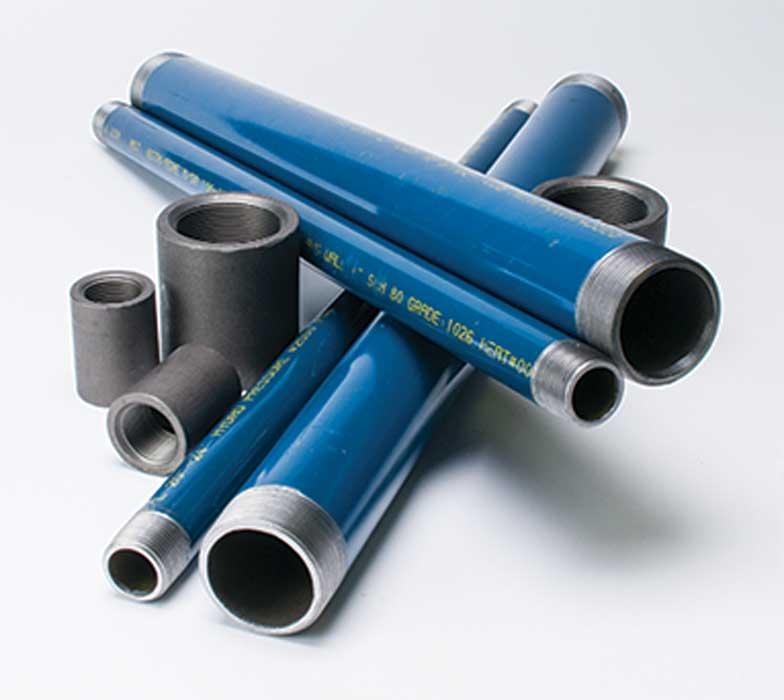
Figure 3
For products that need a corrosion preventive more durable than galvanizing, MST provides Blue Diamond®, a proprietary UV-cured coating.
“We try to ship within three or four weeks on most products,” Sleder said.
The company’s ability to deliver shipments quickly can show up in the order book in unusual ways.
“We received an inquiry from four or five companies,” Fairley said, referring to shipment destined for a refinery. “We later received the order, and two weeks later we received an identical order.” The contractor was afraid that the material might not show up at the refinery, so it placed the entire order a second time.
“We shipped the second order days after the first one,” Fairley said. By that time, word had gotten around the industry that this was MST’s area of expertise.
“Eventually someone who worked for the refinery, which was owned by one of the international oil companies, called to ask if we were the company that shipped these two large orders, one right after the other,” Fairley said.
Before that phone call, the staff at MST had no idea that its reputation had extended that far.
Found All the Parts
MST’s executive team doesn’t take all the credit for the company’s success. It shares the acclaim with a capable and engaged workforce (many have more than 30 years of experience). Credit also goes to its owner, Optima Specialty Steel, for making strategic investments. The management team also cites its steel suppliers for their willingness to go the extra mile when necessary.
Finally, the executive team owes a debt of gratitude to the many customers whospread the word about the small company with the solid reputation for making products for mechanical, oil-and-gas, and pressure applications, including occasional parts for vintage automobiles.
MST Seamless Tube & Pipe, 400 McMunn St., South Lyon, MI 48178, 800-521-8416, www.mstube.com
About the Author

Eric Lundin
2135 Point Blvd
Elgin, IL 60123
815-227-8262
Eric Lundin worked on The Tube & Pipe Journal from 2000 to 2022.
About the Publication
Related Companies
subscribe now
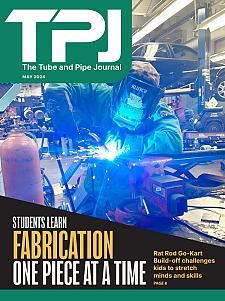
The Tube and Pipe Journal became the first magazine dedicated to serving the metal tube and pipe industry in 1990. Today, it remains the only North American publication devoted to this industry, and it has become the most trusted source of information for tube and pipe professionals.
start your free subscription- Stay connected from anywhere

Easily access valuable industry resources now with full access to the digital edition of The Fabricator.

Easily access valuable industry resources now with full access to the digital edition of The Welder.

Easily access valuable industry resources now with full access to the digital edition of The Tube and Pipe Journal.
- Podcasting
- Podcast:
- The Fabricator Podcast
- Published:
- 04/16/2024
- Running Time:
- 63:29
In this episode of The Fabricator Podcast, Caleb Chamberlain, co-founder and CEO of OSH Cut, discusses his company’s...
- Trending Articles
Zekelman Industries to invest $120 million in Arkansas expansion

3D laser tube cutting system available in 3, 4, or 5 kW
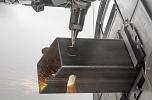
Corrosion-inhibiting coating can be peeled off after use
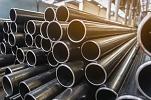
Brushless copper tubing cutter adjusts to ODs up to 2-1/8 in.

HGG Profiling Equipment names area sales manager

- Industry Events
16th Annual Safety Conference
- April 30 - May 1, 2024
- Elgin,
Pipe and Tube Conference
- May 21 - 22, 2024
- Omaha, NE
World-Class Roll Forming Workshop
- June 5 - 6, 2024
- Louisville, KY
Advanced Laser Application Workshop
- June 25 - 27, 2024
- Novi, MI
























